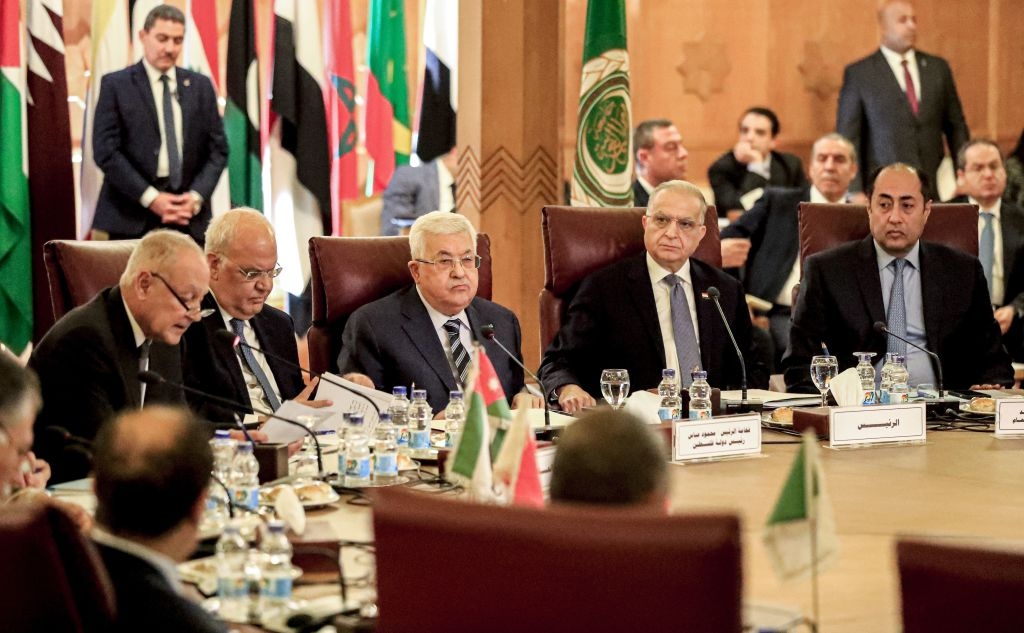In this mailing:
- Bassam Tawil: Islamists' Response to Peace Plan
- Lawrence A. Franklin: Why Did President Trump Expand the Travel Ban?
- Does Taking Cannabis Change Your Brain More than Drinking Alcohol Does?
by Bassam Tawil • February 18, 2020 at 5:00 am
When Hizb-ut-Tahrir says that negotiations and a peace process with Israel are acts of treason, their words are pointed straight at Abbas and the PA leadership. When Hizb-ut-Tahrir says it wants Muslim armies to liberate all of Palestine, the organization is actually calling on Muslims to march on Israel, kill Jews and destroy the state. While the ideology of Hizb-ut-Tahrir might sound inhospitable, it is shared by Hamas, Palestinian Islamic Jihad and several other Palestinian terror groups -- particularly regarding the goal of eliminating Israel. By continuing to incite their people against Israel and the US... Abbas... and other PA officials are driving more Palestinians into the open, welcoming arms of Hizb-ut-Tahrir as well as Iran's proxies, Hamas and Palestinian Islamic Jihad. By allowing thousands of Islamists to call for the destruction of Israel on the streets of West Bank cities, PA leaders are digging their own graves: The same people they are inciting against Israel and the US will kill these leaders not only for being affiliated with Israelis and Americans but for being too "moderate." Finally, by making, as they usually do, contradictory claims to their own people, they are losing, among the Palestinians, the little credibility they have left.

At an emergency meeting of the Arab League in Cairo on February 1, Palestinian Authority President Mahmoud Abbas (center) declared that "there will be no relations with Israel and the US, including on security cooperation." (Photo by Khaled Desouki/AFP via Getty Images)
The Palestinian Authority, after rejecting US President Donald Trump's recently unveiled plan for Mideast peace, "Peace to Prosperity," as a "conspiracy" against Palestinians, is now trying to persuade the Israeli public that it is "still" interested in achieving peace with Israel. Earlier this month, PA President Mahmoud Abbas announced that he would cut all ties with Israel and the US, including security coordination, to protest the Trump plan, which he denounced as the "slap of the century." "We are informing you," Abbas told Arab foreign ministers during an emergency meeting in Cairo, "that there will be no relations with Israel and the US, including on security cooperation." Abbas has been making similar threats for the past three years -- probably the reason Palestinians have long stopped taking his threats seriously.
Continue Reading Article
by Lawrence A. Franklin • February 18, 2020 at 4:30 am
General justifications for the travel ban include: poor vetting of travelers to the U.S. by the restricted countries; an unwillingness on the part of those countries to share personal data on would-be visitors to the U.S.; and the refusal to accept the return of their nationals if expelled by U.S. authorities. Kyrgyzstan made the travel-ban list largely because of its lax passport issuance, which has caused a global glut of false Kyrgyzstani passports used by criminals and terrorists to enter Eurasian countries. Kyrgyzstan is also notable for its poor counter-terrorism efforts. The U.S. Supreme Court ruled in June 2018 that the U.S. president has the authority to issue such travel bans as part of his duty to protect American citizens. The ruling also determined that the first list of countries placed on the restricted visa program in 2017 did not constitute a "Muslim ban," as North Korea and Venezuela were also included.... Eritrea has more Christians than Muslims. Myanmar is almost entirely Buddhist. Homeland Security Secretary Chad Wolf, arguing for the administration, opined that it is only logical that any people applying for a visa to the U.S. be properly vetted.

The U.S. Supreme Court ruled in June 2018 that the U.S. president has the authority to issue travel bans as part of his duty to protect American citizens. Homeland Security Secretary Chad Wolf (right), arguing for the administration, opined that it is only logical that any people applying for a visa to the U.S. be properly vetted. (Official White House Photo by Tia Dufour)
There are general and specific justifications for U.S. President Donald Trump's January 31 order to add Nigeria, Tanzania, Eritrea, Kyrgyzstan, Sudan and Myanmar (Burma) to the list of seven other countries -- Iran, Libya, North Korea, Somalia, Syria, Venezuela and Yemen -- subjected to a restriction on travel to the United States. General justifications for the travel ban include: poor vetting of travelers to the U.S. by the restricted countries; an unwillingness on the part of those countries to share personal data on would-be visitors to the U.S.; and the refusal to accept the return of their nationals if expelled by U.S. authorities. Although each of the additional six countries added to the list will be subjected to restricted travel – as of February 22 -- Sudan and Tanzania also will be ineligible to participate in the State Department's "green card lottery" program.
Continue Reading Article
February 18, 2020 at 4:00 am

(Image source: iStock)
Gatestone Institute to examine the impact of legalized marijuana in 2020. Details to follow...
|
|
|
|




